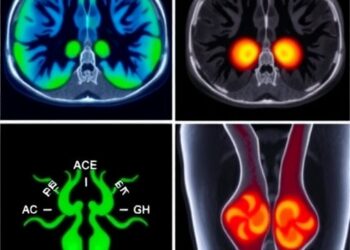In a groundbreaking study set to transform neonatal care protocols, researchers have unveiled new insights into the screening practices for neonatal hypoglycemia (NH) among infants born to mothers who did not undergo adequate oral glucose tolerance testing (OGTT) during pregnancy. This emerging body of work addresses a critical gap in perinatal medicine: ensuring timely and accurate detection of hypoglycemia in newborns when maternal glucose regulation status is unclear or undocumented.
Neonatal hypoglycemia remains one of the most common metabolic complications in the early postnatal period, posing significant risks to infant neurodevelopment when left unrecognized or untreated. Traditionally, early identification strategies rely heavily on maternal gestational diabetes mellitus (GDM) diagnosis based on OGTT performed during pregnancy. However, the absence of standardized screening in cases where mothers have incomplete or no OGTT data creates a challenging clinical scenario. This research aims to elucidate current practices and propose evidence-based guidelines to bridge this diagnostic void.
The interdisciplinary study conducted by Scholl, Ponnapakkam, Molina, and colleagues meticulously examined screening approaches across multiple healthcare centers, focusing exclusively on neonates born to mothers without sufficient glucose tolerance testing. Their work highlights a wide variability in screening timing, glucose threshold values, and follow-up protocols, underscoring the pressing need for uniform practice standards. Importantly, the authors employed rigorous retrospective data analysis complemented by prospective observational cohorts to ensure robust findings.
Central to their findings is the demonstration that infants born under these circumstances exhibit a similarly elevated risk of hypoglycemia as those born to mothers with diagnosed GDM. The metabolic derangements in neonates appear linked not only to overt maternal hyperglycemia but also to subtle disruptions in maternal glucose homeostasis not captured without comprehensive OGTT. This revelation challenges the prevailing notion that routine hypoglycemia screening can be safely omitted when maternal glucose status is unknown.
Moreover, the study documents the recurrent clinical dilemma faced by neonatal care teams: balancing the need to avoid unnecessary interventions against the imperative to prevent neuroglycopenic injuries due to missed hypoglycemia cases. The research suggests a stratified screening protocol incorporating initial risk assessment based on maternal history, fetal growth parameters, and early postnatal glucose monitoring to improve sensitivity without inundating NICUs with false positive cases.
Additionally, the authors delve into the pathophysiological mechanisms underpinning neonatal hypoglycemia. They contextualize how inadequate maternal OGTT data limits clinicians’ ability to anticipate neonatal endocrine responses. In pregnancies complicated by undiagnosed or misclassified glucose intolerance, fetal pancreatic islet cell hyperplasia and resultant hyperinsulinemia may predispose neonates to rapid postnatal glucose depletion. These insights emphasize the vital role of maternal metabolic assessment in guiding neonatal surveillance initiatives.
The study also critically evaluates the timing of initial glucose testing in the first hours after birth. While most guidelines advocate for glucose checks within the first 1-2 hours in at-risk infants, ambiguity surrounding infants born to mothers with undocumented glucose tolerance status results in heterogeneous clinical responses. The paper recommends early, frequent glucose monitoring coupled with a low threshold for intervention in this subset to mitigate neurological sequelae effectively.
Importantly, this research sheds light on the ethical and practical dimensions of neonatal screening policy—particularly in resource-limited settings. The authors argue for the development of a cost-effective, evidence-based framework that maximizes early detection rates without imposing undue burdens on healthcare resources. Their proposed algorithms aim to ensure equitable neonatal outcomes regardless of maternal testing completeness, a major step towards reducing healthcare disparities.
Cutting-edge analytical methodologies were integral to this work. The team harnessed advanced statistical modeling and machine learning techniques to identify subtle risk predictors for NH when maternal glucose tolerance data was missing. Such integration of computational tools with clinical insight exemplifies the evolving paradigm in perinatal epidemiology and highlights the potential for precision medicine approaches in neonatal care.
Furthermore, the implications of these findings extend beyond immediate neonatal management. By advocating for more rigorous maternal glucose assessment protocols during pregnancy and reinforcing neonatal screening vigilance, this study aligns with broader public health goals of reducing childhood morbidity linked to metabolic disorders. It suggests a dynamic interplay between maternal antenatal care and postnatal infant health that could influence future obstetric guidelines and neonatal screening policies globally.
The researchers also emphasize the importance of parental education and engagement in early NH screening practices. Given that mothers without comprehensive OGTT results may represent populations with limited access to prenatal care, targeted communication strategies are essential to empower families in recognizing signs of hypoglycemia and ensuring adherence to recommended screening schedules.
Clinical translation of these findings will necessitate multidisciplinary collaboration involving obstetricians, neonatologists, endocrinologists, and nursing staff. Establishing institutional protocols that account for maternal OGTT status and integrating electronic health record alerts can streamline screening workflows and enhance patient safety outcomes. The authors call for future prospective trials to validate their recommendations and further refine risk stratification models.
In conclusion, this trailblazing research by Scholl and colleagues sets a new benchmark in neonatal hypoglycemia screening by addressing a previously under-recognized high-risk group: infants born to mothers lacking adequate glucose tolerance testing. Their comprehensive, data-driven approach paves the way for standardized protocols that can prevent potential neurodevelopmental impairments stemming from undiagnosed neonatal hypoglycemia. As neonatal metabolic care continues to evolve, this study signifies a pivotal advance in safeguarding infant health through informed maternal-infant screening integration.
Subject of Research:
Neonatal hypoglycemia screening practices in infants born to mothers without adequate oral glucose tolerance testing.
Article Title:
Neonatal hypoglycemia screening practices in infants born to mothers without glucose tolerance testing.
Article References:
Scholl, J., Ponnapakkam, A., Molina, R. et al. Neonatal hypoglycemia screening practices in infants born to mothers without glucose tolerance testing. J Perinatol (2025). https://doi.org/10.1038/s41372-025-02455-2
Image Credits: AI Generated
DOI: https://doi.org/10.1038/s41372-025-02455-2




